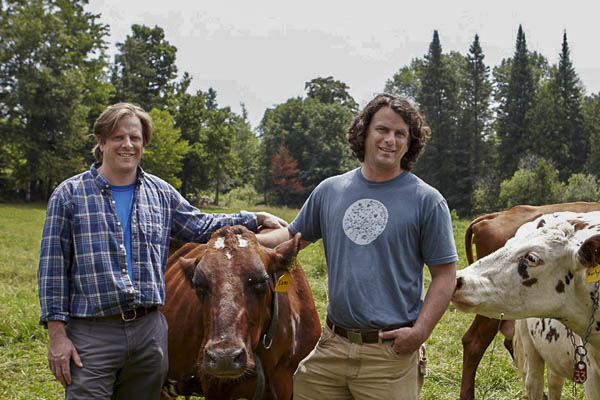October is American Cheese Month, and I’m celebrating by inviting some American cheese luminaries to take over Planet Cheese. Each of these guest bloggers will share their perspective on a cheesy topic that they are passionate about.
Mateo Kehler (above right), this week’s guest, owns Vermont’s Jasper Hill Farm with his brother, Andy (above left). The brothers also operate the Cellars at Jasper Hill, an important aging facility for their own cheeses and others. Harbison, the 2018 American Cheese Society competition’s Best of Show, is a Jasper Hill creation. What’s on Mateo’s mind? Let’s find out.
My brother Andy and I started making cheese in Greensboro, Vermont, in the spring of 2003. We wanted to satisfy three fundamental needs: meaningful work, in a place that we love, with people we love.
We set about developing a business built around a collection of cheeses that would serve as the economic mechanism we would leverage to protect the working landscape in Vermont’s Northeast Kingdom.
We are in the midst of a protracted downturn in milk pricing, and there is a quiet apocalypse unfolding across the Vermont dairy landscape as farmers’ equity is eroded and multi-generational farms are forced out. To us, raw-milk cheesemaking serves as a departure from commodity agriculture, which has failed our community, environmentally and economically.
Our mission as a business is to reinvent the way in which dairy is financed in our community. Raw-milk cheese cannot be commoditized. As we set out to develop cheeses that are truly a “taste of place,” we have learned how to manage the microbial ecology on our farms. We have also learned how traditional practices maximize microbial diversity while limiting or excluding pathogens.
There is a linear correlation between microbial diversity and complexity of flavor. It may seem simple, but the quality of raw-milk cheese is directly linked to the quality of the milk it is made from.
Raw-milk beauty: Jasper Hill Bayley Hazen | Meg Smith Photography
To make great raw-milk cheese, you need great raw milk. It must be fresh and, to be safe, it must be from animals that are carefully managed. The microbial ecology of raw milk is the sum of the practices on a farm. Raw-milk cheese offers a direct link to these practices. It is more expensive to produce and, in turn, should be more valuable.
Pasteurization, in contrast, is an apology for the practices on a farm, effectively severing the link between a cheese and those practices. This is not to say that it is not possible to make delicious cheeses from pasteurized milk. There are many (and we produce a few). But they have no connection to place or farm practices and can be industrialized and commoditized in a way that is almost impossible for a raw-milk cheese.
To complicate matters, many of the U.S. cheeses that claim to be made from raw milk are in fact made with heat-treated milk. This procedure, which involves heating milk to sub-pasteurization temperatures, effectively severs the link to the milk’s base microbiology and to the practices on the dairy farm. I can count on one hand the U.S. cheesemakers who produce raw-milk cheese sold nationally.
In an age of consolidation, as artisan cheesemakers are bought up by multinational corporations and become brands in a portfolio, and as distribution channels narrow and retailers swallow each other whole (think Amazon purchasing Whole Foods), Jasper Hill is doubling down on the work we started in 2003. We are making cheeses that cannot be commoditized, cheeses that reflect our values and can support our landscape (and the people living and working on it) for generations to come.
This is an existential moment for cheesemaking in the U.S. We face the loss of deliciousness, the link to our primordial roots and the opportunity to connect to real people in real places producing cheeses that reflect a landscape. For thousands of years, raw-milk cheeses have nourished civilizations, supported economies and reflected the nuances of climate, geography and culture. Will we miss them when they’re gone?


